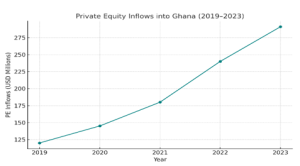
By Andrews AYIKU (Ph.D)
AI technologies, such as machine learning, data analytics, and automation, help businesses make data-driven decisions, automate repetitive tasks, and improve customer experiences. AI can be a game changer for Ghanaian SMEs, which face resource constraints and fierce market competition.
From automating inventory management to detecting fraudulent transactions, AI enables organizations to run more effectively while reducing losses. AI adoption does not require significant funds; inexpensive, scalable solutions are already available to small enterprises.
By strategically implementing AI, SMEs can lower operational costs, increase productivity, and secure revenue streams, putting them on track for long-term success in Ghana’s dynamic market. This article looks at six practical ways for Ghanaian SMEs to use AI to achieve these goals.
Automating Routine Business Processes
Many SMEs in Ghana use manual processes for accounting, payroll, and customer service, which are time-consuming and prone to errors. These operations can be streamlined using AI-powered automation solutions like chatbots and accountancy software.
For example, AI chatbots can manage consumer enquiries 24 hours a day, seven days a week, minimizing the need for big customer support teams. QuickBooks integrates with AI to automate bookkeeping, manage costs, and generate financial reports, reducing errors and saving time. By automating monotonous operations, SMEs can save money on labor and allow employees to focus on high-value activities like strategy and innovation.
Optimizing Inventory Management
Inventory mismanagement is a significant cause of revenue leakage for small and medium-sized enterprises, notably in retail and manufacturing. Overstocking ties up capital, whereas understocking results in lost sales. AI-powered inventory management systems, such as Zoho Inventory, forecast demand using predictive analytics that consider historical data, market trends, and seasonality. AI can help Ghanaian SMEs optimize stock levels, eliminate waste, and avoid stockouts. For example, a local retailer in Accra can use AI to forecast peak demand during the holiday season, ensuring optimal inventory without incurring additional costs.
Enhancing Fraud Detection and Prevention
Fraudulent actions such as employee theft, supplier overbilling, or customer payment fraud are common sources of revenue leakage. AI-powered fraud detection systems use transaction patterns to discover anomalies in real time. Artificial intelligence tools, such as Fraud.net, can detect suspicious transactions, such as unusual payment amounts or irregular supplier invoices. In Ghana, where mobile money platforms such as MTN Mobile Money are popular, SMEs can utilise AI to monitor transactions and spot fraud early. These techniques preserve revenue while also reducing the need for costly audits or enquiries.
Improving Customer Relationship Management
Maintaining excellent customer connections is crucial for SMEs, but manually recording client contacts can be inefficient. AI-powered Customer Relationship Management (CRM) solutions, such as HubSpot and Salesforce, leverage data analytics to personalize customer experiences and increase retention. For example, a SME in Kumasi can use AI to analyze customer purchasing history and recommend tailored products, increasing sales without incurring additional marketing costs. AI can also automate follow-up emails and predict client turnover, allowing firms to handle issues before they become problems. By improving customer happiness, SMEs can increase repeat business and close revenue gaps created by customer attrition.
Streamlining Supply Chain Operations
Supply chain inefficiencies, like as delays or high transportation costs, can reduce SMEs’ revenues. Artificial intelligence can improve supply chain logistics by analyzing data on supplier performance, shipping costs, and delivery timeframes. Artificial intelligence platforms, such as IBM Supply Chain Intelligence Suite, can recommend the most cost-effective suppliers or routes. In Ghana, where SMEs frequently face challenges such as unreliable logistics and fluctuating fuel prices, artificial intelligence can assist in negotiating better supplier contracts and optimizing delivery schedules. Small and medium-sized enterprises (SMEs) can enhance cash flow and reduce revenue losses by lowering supplier costs and delays.
Leveraging Predictive Analytics for Financial Planning
Financial mismanagement is a significant challenge for SMEs, leading to cash flow issues and revenue leakages. AI-powered predictive analytics tools, such as those offered by Xero or Microsoft Power BI, can analyze financial data to forecast revenue, identify cost-saving opportunities, and detect potential risks. For example, a Ghanaian SME in the agribusiness sector can use AI to predict crop price fluctuations and adjust pricing strategies accordingly. By providing insights into cash flow trends and expense patterns, AI enables SMEs to make informed decisions, reduce unnecessary expenditures, and ensure financial stability.
Conclusion
AI is no longer a luxury reserved for giant organizations; it is a potential tool for Ghanaian SMEs seeking to cut expenses and fix income leaks. SMEs can achieve significant savings and increased profitability by automating processes, optimizing inventory, detecting fraud, improving customer relationships, streamlining supply chains, and leveraging predictive analytics. While barriers such as cost and skill exist, affordable AI solutions and local support systems make adoption possible.
Dr Ayiku is a Senior Lecturer/SME Industry Coach Coordinator (MBA Impact Entrepreneurship and Innovation) University of Professional Studies Accra
IG: andy_ayiku
@AndrewsAyiku
F: Andyayiku
The post How SMEs can use AI to prevent revenue leaks appeared first on The Business & Financial Times.
Read Full Story










Facebook
Twitter
Pinterest
Instagram
Google+
YouTube
LinkedIn
RSS